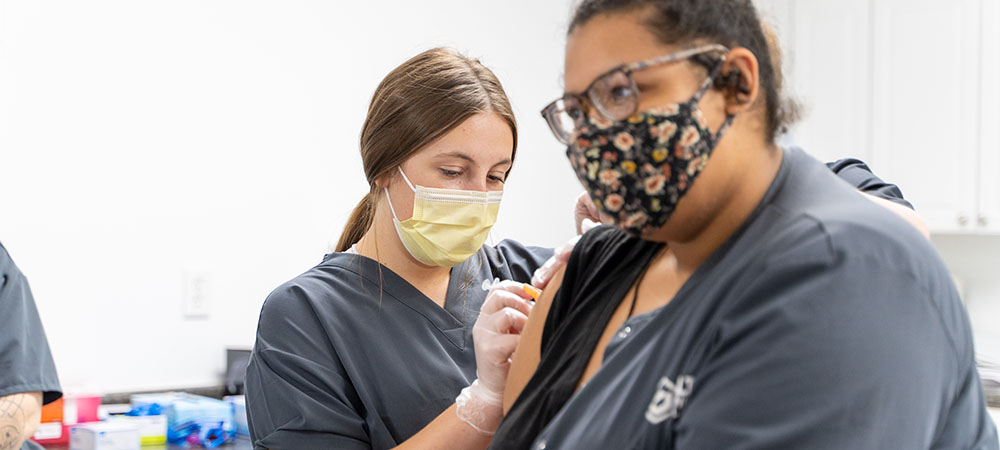Vocational school is a type of postsecondary education that trains students for a specific line of work, often in healthcare or other hands-on fields. Vocational schools are different from typical four-year colleges because the programs are less academic and more job-focused. The goal of a vocational school is to equip students with the skills they need to enter the workforce of their choosing.
Vocational School Definition
Merriam Webster defines vocational school as “a school in which people learn how to do a job that requires special skills.”[1] While important concepts may be taught the focus is less on theory and more on practice. Vocational schools offer realistic, practical, relevant skills training.
“Special skills” means that not everyone can do the job. For example, a high school student wanting to be a nurse cannot just start drawing blood and doing a nurse’s job if they have no prior experience or training. A vocational school provides a training environment for students to gain those special skills.
The word vocation is also important to the definition. What is a vocation? A vocation can be another word for “occupation,” which essentially means a job, or type of work. But vocation can also mean “a summons or strong inclination to a particular state or course of action.”[2] Some people are drawn to enter certain fields, such as nursing or cosmetology. A vocational school offers instruction, guidance, and practice to help people begin the career they desire.
How long does vocational school last?
Vocational training programs are unique, and every school is different, but the advantage of vocational school over other types of colleges is that the length of training is usually shorter. Because career training at a vocational school is highly focused and specific, a vocational program may be completed in a matter of months. Many entry-level training programs offer a course of study that can be complete in under a year. Some advanced programs may last two years, but rarely do vocational classes last longer than that.
Interested in Learning More About MTI?
Fill out the form below to receive info about our career training programs.
How much does vocational school cost?
The cost of tuition, supplies, and housing will vary depending on the type of school, the location, and the vocational program. Every school and every program is different. However, a typical vocational training program, for example, massage therapy or medical assisting, may cost anywhere in the range of $12,000-$15,000[3][4] for a nine-month program.
Vocational schools often offer access to scholarships, grants, or loans. The cost of training is also only one factor in a long-term career plan. Students considering vocational school should think about their future earning prospects. One of the main reasons people may choose to enroll in vocational school is because they can foresee themselves enjoying a long and prosperous career, and want to start earning a salary quickly.
Benefits of Vocational School
People choose to enroll in vocational school for a variety of reasons, for example they
- have a career goal in mind and want to start working as soon as possible.
- want to learn the skills needed to land the job they want.
- want to be a competitive job applicant.
- want to enter growing and in-demand fields.
- want to increase their earning potential.
- don’t want to waste time or energy on “extracurricular” credits or activities.
- want high-level professional guidance.
- want to practice their skills in real-life settings.
- want to be around a dedicated peer group.
- want a flexible class schedule.
- want to prepare to pass a certification exam.
- want to be connected to a community.
- want to advance or specialize their skills even further.
Vocational schools are intensive learning experiences designed to set students up to succeed in their field. The training is specific and relevant to the work they would do in their professional setting. Unlike a community college or four-year institution, no extra classes are necessary to graduate. This means more time to develop career-focused skills in preparation for on-the-job success and fulfillment.
Each vocational program is very different from the rest because every job is unique. A pharmacy technician won’t need to know the same types of things that a dental assistant does, and vice versa. A vocational school might also train students to pass some sort of certification exam, if necessary to their field and state requirements.
Types of Vocational Training Programs
There are lots of different types of vocational programs designed for specific careers. Here is a short list of some examples:
- Medical Assisting
- Dental Assisting
- Cosmetology
- Medical Coding
- Pharmacy Technician
- Nursing Assistant
- Massage Therapy
In short, vocational school provides career-training opportunities so that people can be competitive in the job market and start doing what they love sooner.
Sources
- [1] https://www.merriam-webster.com/dictionary/vocational%20school
[2] https://www.merriam-webster.com/dictionary/vocation
[3] https://www.midwesttech.edu/documents/GE/SPIL-MT.html
[4] https://www.midwesttech.edu/documents/GE/SPIL-MA.html



